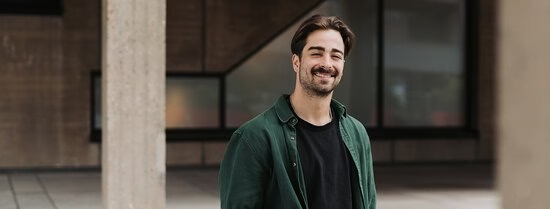Alumna International Bachelor Arts & Culture
Choosing an Arts & Culture study programme
After high school and a subsequent gap year, I did not have a specific career path in mind. The only thing I knew is that I wanted to be involved in the cultural sector, as in my spare time I regularly went to the cinema, museums, concerts, and I enjoyed nightlife. I ended up studying the International Bachelor Arts & Culture Studies (IBACS) at Erasmus University Rotterdam (EUR). Why I chose this study programme? That’s what you will read below!
The main reason for me to study IBACS was the broad approach of this bachelor programme, which is unique in the Netherlands. It allows you to study culture from different theoretical perspectives, from sociology to economics. In addition, studying on campus in an international environment really appealed to me. I thought learning in a classroom with students from all over the world, who all bring their own stories to the table, is extremely valuable - especially in the context of arts and culture. In retrospect, this certainly turns out to be true. The possibility to go on exchange was another important factor for me to choose IBACS. During my studies, I gladly made use of this opportunity by studying in Tokyo for six months.
Last but not least, I found the fact that this international programme is taught in Rotterdam a big plus. It is a super-diverse city home to many creative and talented people. The cultural and creative industries are vibrant and resilient, ranging from interesting established cultural institutions and world-renowned architecture firms to impactful grassroots initiatives.
Job hunt
After completing my master programme Cultural Economics and Entrepreneurship at EUR, I was ready to enter the labour market. I started looking for vacancies and applied to various cultural and government organisations in the Netherlands. In my search, I visited several places, such as museums, to discover whether I could envision myself working there. Besides that, I told my network – friends, family and acquaintances – that I was looking for a job.
At some point the vacancy of Assistant to the Board of Directors at International Film Festival Rotterdam (IFFR) caught my attention. The position matched my interest in the film industry, as well as my work experience, as I had previously completed an internship at a film production and distribution company. Since I was not exactly sure what specific direction would suit me when job hunting, I thought it would be a perfect starting position to get to know the insights of an organisation and develop myself professionally. Now I am working as Coordinator Funding and Private Partners at International Film Festival Rotterdam.
Theory put into practice at IFFR
Together with three colleagues, I work in the Funding and Business Growth department at International Film Festival Rotterdam. I find it very valuable to work in a small team, as we exchange ideas and learn from each other's expertise and jointly contribute to improving the financial position of the organisation. The focus in my role is mainly on identifying funding opportunities, writing funding applications and relationship management. My role requires staying up-to-date on the (inter)national cultural funding landscape, creating and executing communication plans, and doing research.
My studies at the Erasmus School of History, Culture and Communication have backed me up with knowledge on the value of culture from different academic perspectives and deepened my understanding of the developments and mechanisms driving the cultural and creative industries. I literally put the academic theory I learned during my studies into daily practice when writing and brainstorming. The various group assignments during my studies have contributed to my ability to collaborate on projects at work. Different concepts covered during the courses, for example social impact and cultural participation, are important when thinking about organising and financing our activities. Here, the analytical and critical thinking skills I learned at the university, come in handy.
Golden tip(s)
My first tip is to gain experience and practical skills outside your studies, by volunteering, working and/or joining an association. Most cultural events in Rotterdam simply cannot exist without their volunteers. The film festival, for example, would not take place without its 600 volunteers, many of which are – international – students. Through volunteering you get a behind the scenes experience and connect with fellow Rotterdam residents over a shared passion.
Secondly, the mandatory internship in IBACS is a great opportunity to find out where your qualities lie and to gain confidence in the professional field. This period helps to reflect and ask yourself questions to figure out in what field you want to enter the labour market. The internship also allows you to think about the kind of working environment that makes you thrive: a small or large organisation, hierarchical or more horizontal, and so on.
Finally, and perhaps the most important tip: explore and enjoy all that the city of Rotterdam has to offer. The Rotterdam mentality is contagious. Try to look around and see what is happening in the city. Visit places that give you energy and inspiration. You never know who you will meet and what it can bring you.

